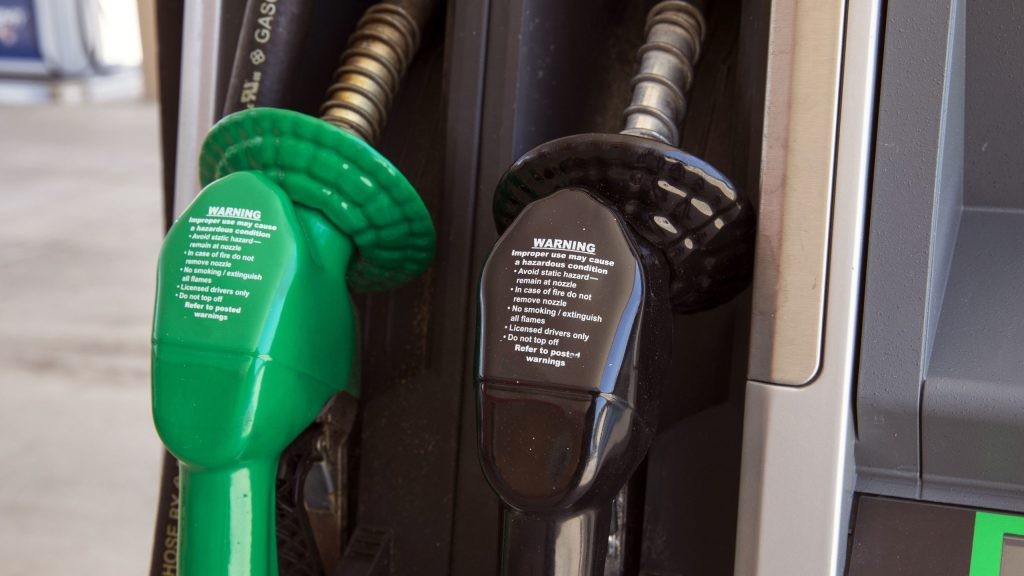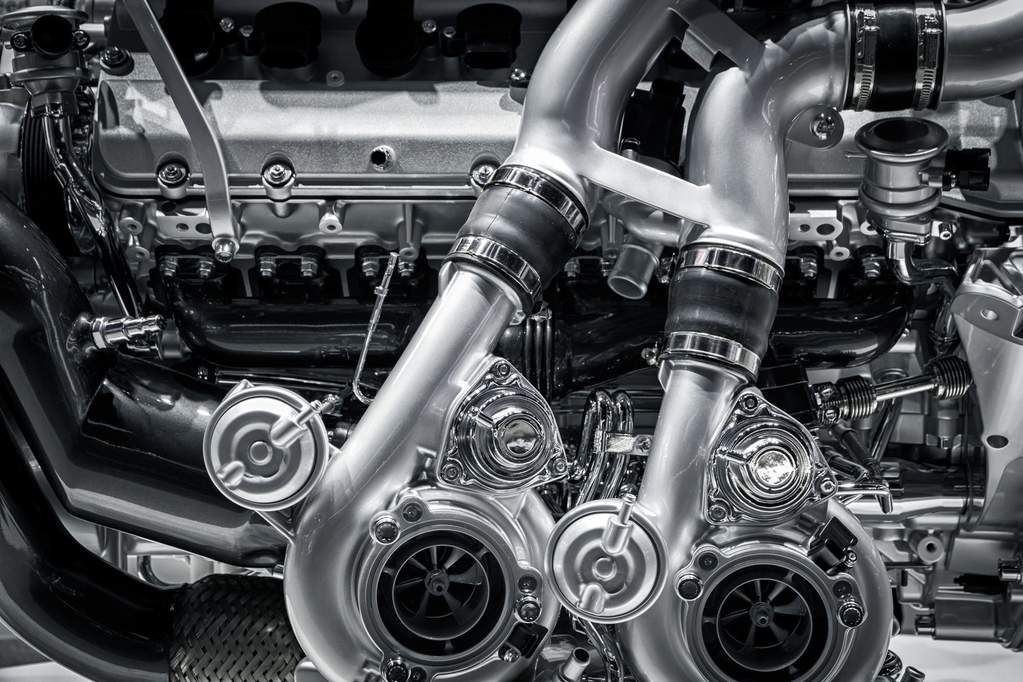Diesel and gas (gasoline) are both derived from crude oil, yet they serve distinctly different purposes in the automotive world and beyond. While both are fuels that power internal combustion engines, the debate of Diesel Versus Gas extends far beyond just fuel type. Diesel fuel is often associated with heavy-duty machinery and vehicles requiring substantial torque, while gasoline is typically linked to vehicles prioritizing speed and agility.
However, the actual distinctions between diesel and gas are multifaceted, encompassing aspects like engine durability, fuel economy, and overall reliability. Let’s delve into a comprehensive comparison to understand the fundamental differences between diesel and gasoline.
Fundamental Differences Between Diesel and Gas
 Gasoline and Diesel Fuel Pumps at a Gas Station
Gasoline and Diesel Fuel Pumps at a Gas Station
Both diesel and gasoline originate from the refinement of crude oil, but gasoline undergoes a more intensive refining process. This additional refinement makes gasoline less dense and more volatile compared to diesel. In practical terms, gasoline’s rapid combustion allows it to generate more horsepower, which is crucial for speed and acceleration.
Diesel fuel, conversely, is denser and evaporates at a slower rate. It boasts a higher energy density, meaning a given volume of diesel fuel contains approximately 20% more energy than the same volume of gasoline.
This inherent energy advantage is why diesel engines are favored in heavy machinery and vehicles designed for demanding tasks. They excel at producing greater energy at lower engine speeds (RPMs), delivering superior torque—the rotational force needed for pulling and hauling heavy loads. Gasoline engines, in contrast, are better suited for lighter vehicles where high torque is less critical, and achieving higher speeds is the priority.
Diesel Engines vs. Gasoline Engines: How They Work
 Diagram Illustrating the Internal Mechanisms of a Diesel Engine
Diagram Illustrating the Internal Mechanisms of a Diesel Engine
Both diesel and gasoline engines harness the principle of internal combustion to generate power. In essence, fuel is combusted within an enclosed space—the combustion chamber—creating an explosion that drives a piston. This piston movement, in turn, rotates the crankshaft, ultimately propelling the vehicle’s wheels.
While the core concept is shared, the combustion process itself is where diesel and gasoline engines diverge significantly.
Gasoline engines operate on a spark-ignition principle. Air and fuel are mixed before being drawn into the cylinder and compressed by the piston. A spark plug then ignites this mixture, initiating combustion. The resulting explosion pushes the piston down, transferring power to the crankshaft and onward to the wheels.
Diesel engines, however, operate without spark plugs, employing a compression-ignition system. Unlike gasoline engines where a spark initiates combustion, diesel fuel requires vaporization before ignition. The process begins with air being compressed in the combustion chamber. As air is compressed, its temperature rises dramatically due to increased pressure. When vaporized diesel fuel is injected into this superheated air, it spontaneously ignites, leading to combustion. In colder conditions, some diesel engines utilize glow plugs to preheat the combustion chamber, ensuring reliable ignition.
Diesel engines are characterized by high compression ratios, a key factor in their superior efficiency compared to gasoline engines. This higher compression allows for more complete combustion of the fuel, extracting more energy.
Durability: Diesel vs. Gas Engines
Alt text: Powerful diesel engine installed in a commercial truck, highlighting robust construction and components designed for heavy-duty applications and longevity.
Diesel engines are generally recognized for their enhanced durability compared to gasoline counterparts. This inherent robustness is a primary reason why diesel engines are prevalent in work trucks and heavy-duty applications. A diesel engine can often accumulate significantly more miles than a gasoline engine before requiring major maintenance or repairs.
Typically, a well-maintained diesel engine can achieve a lifespan of approximately 250,000 to 300,000 miles, and sometimes even more. In contrast, gasoline engines often have a shorter lifespan, typically requiring more significant attention around the 150,000-mile mark. This substantial difference in longevity stems from both fundamental engine design and the properties of the fuel itself.
Engine Design and Durability
Diesel engines are built with robustness in mind. They feature larger, heavier components including cylinders, crankshafts, and pistons. Their design philosophy emphasizes simplicity and reliance on fundamental mechanical operations. Constructed from heavy-duty materials, diesel engines are engineered to withstand continuous, demanding operation. With engine components largely fixed in position, movement is minimized, reducing wear and tear over time.
Gasoline engines, conversely, represent more complex engineering. Often employing chains and belts, they incorporate numerous smaller, precision-engineered parts. The stop-and-go nature of typical driving conditions places stress on gasoline engines, contributing to increased wear and tear.
Fuel Type and Engine Wear
Diesel fuel, despite its higher density, possesses an oil-like consistency, providing inherent lubrication to engine components. As diesel circulates within the engine, it continuously lubricates cylinders and other moving parts, minimizing friction. The larger size of diesel engines also facilitates better oil circulation, enhancing lubrication effectiveness.
Furthermore, diesel’s viscosity decreases with temperature, becoming less dense at higher temperatures. This characteristic, combined with its ease of combustion, contributes to reduced wear and tear within diesel engines.
Gasoline, in contrast, acts more like a solvent and exhibits a more acidic nature compared to diesel. During combustion, gasoline can promote corrosion, leading to roughening of engine surfaces. This corrosive effect contributes to increased wear and tear within gasoline engines over time.
Fuel Efficiency: Diesel vs. Gas
Fuel efficiency is another key differentiator between diesel and gasoline vehicles. Diesel vehicles generally offer superior fuel economy compared to gasoline cars. This advantage arises from diesel’s higher energy density, efficient low-RPM performance, and higher compression ratios.
As previously mentioned, diesel fuel inherently contains about 20% more energy per gallon than gasoline. This energy density translates directly into greater fuel efficiency. Diesel engines can often deliver comparable power to gasoline engines but at lower RPMs, meaning they burn fuel at a slower rate for a given output.
The higher compression ratios in diesel engines are directly linked to improved thermal efficiency. A higher compression ratio allows for more complete combustion, extracting more energy from the fuel. This results in more potent explosions and greater overall energy production.
Gasoline engines are limited in their achievable compression ratios. Exceeding a certain threshold can lead to pre-ignition or detonation, causing uncontrolled explosions that can damage the engine. Consequently, gasoline engines operate at lower compression ratios, resulting in less efficient combustion compared to diesel engines.
Driving patterns also influence fuel economy. Diesel engines are commonly found in vehicles used for long-haul highway driving, such as trucks. Gasoline engines are more prevalent in passenger cars used for daily commuting, often involving stop-and-go city driving. Stop-and-go driving inherently consumes more fuel compared to consistent highway speeds.
Cost of Ownership: Diesel vs. Gas Vehicles
At first glance, the cost of owning a diesel vehicle might appear lower. Diesel cars are known for their fuel efficiency, enhanced durability, and potentially reduced maintenance needs. Diesel engines are inherently robust and can often last for decades before requiring major overhauls.
Gasoline engines, on the other hand, typically consume more fuel, may require more frequent maintenance, and might need more significant repairs as they age, especially beyond 150,000 miles.
This might initially suggest that gasoline engines are a less economical choice. However, when considering the long-term cost of ownership, gasoline engines can often present a more financially sound option, depending on usage patterns. While diesel engines are more robust, they also come with higher upfront and ongoing costs.
The initial purchase price of a diesel vehicle is typically higher than a comparable gasoline-powered vehicle. Furthermore, maintenance and repair expenses for diesel engines can exceed those for gasoline engines. For example, a standard oil change for a gasoline engine might range from $20 to $40, while a diesel oil change can cost $50 to $70 or more, primarily because diesel engines are larger and require more engine oil.
Fuel costs also play a significant role. Historically, diesel fuel prices have often been higher than gasoline prices. While fuel prices fluctuate, this trend can impact the overall cost of ownership. For instance, consider fuel prices and mileage. If diesel averages $3.27 per gallon and a diesel truck gets 22 mpg in the city, while gasoline averages $3.00 per gallon and a gasoline truck gets 19 mpg, driving 10,000 miles would cost approximately $1,500 for diesel and $1,400 for gasoline.
Considering the higher initial vehicle price, potentially higher fuel costs, and more expensive maintenance, the overall cost of ownership for a diesel vehicle can be higher than that of a gasoline vehicle over a typical 10-year ownership period, assuming 10,000 miles driven per year.
Which Engine Type is Right for You?
The choice between diesel and gasoline engines depends largely on individual driving needs and priorities. In general, if your driving is primarily under 12,000 miles per year with typical daily use, a gasoline engine will likely suffice. Moreover, if you prioritize quick acceleration and a more responsive driving experience, gasoline vehicles often offer a more engaging feel.
However, if you frequently drive long distances (15,000+ miles annually), haul heavy loads, or tow trailers, a diesel engine becomes a more compelling choice. While diesel vehicles may have higher upfront and fuel costs, their superior fuel efficiency can offset these expenses over time, particularly for high-mileage drivers. Diesel engines are also well-suited for situations requiring extended idling, such as work trucks or generators.
Check out our extensive collection of used Diesel cars, trucks, and SUVs. Please note that our inventory changes frequently and is subject to prior sales. Be sure to ask us about incoming used Diesel models.
Buy a Used Car or Truck at Trust Auto
Let the experienced professionals at Trust Auto in Sykesville assist you in selecting the ideal vehicle to match your specific requirements. Whether you are in the market for a dependable work truck or a comfortable family vehicle, we are here to guide you through every detail.
Are you searching for a used truck in Virginia? Or perhaps a used car in Washington, DC? The finest selection of used vehicles is just a short drive away. Looking for a used car in Pennsylvania? Or a used SUV in New York? Discover how our convenient remote shopping services can help you find the perfect vehicle without ever leaving the comfort of your home.
When your search includes “best-used car dealer near me,” look no further than Trust Auto. Serving Baltimore and surrounding areas, we offer an extensive inventory of high-quality, low-mileage used vehicles.
